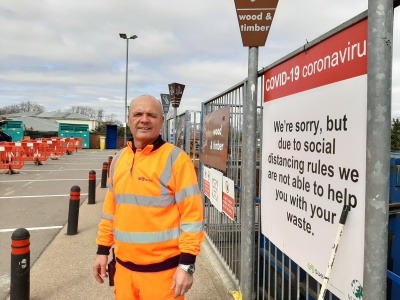A second life in recycling
Finding employment after being released from prison is a pivotal yet difficult task. Emma Love reports on SUEZ’s initiative to give ex-offenders a second chance
For ex-offenders, finding employment after being released from prison is a pivotal task, and one that reduces the likelihood of re-offense by nine per cent, research suggests. However, this task can often be riddled with difficulty, with negative stereotypes about ex-offenders affecting their chances at employment.

Since 2018, SUEZ has run a pilot scheme in Surrey that has sought to solve this issue, yielding significant success. Since its start, the scheme has seen SUEZ take on 19 offenders on release of temporary license
(ROTL), with seven being offered permanent employment upon release.
The scheme has been beneficial to all parties, including the public, with the cost of re-offending to the taxpayer being estimated at 18 billion pounds per year.
The scheme began with the simple intention to involve the prison workforce in recycling collection, with Gareth Swain, Regional Manager for SUEZ in Surrey, initiating a partnership with HMP Ford, a local category D prison.
“We started a relationship with HMP Ford to look purely at increasing recycling. However, HMP Ford quickly explained that they didn’t want prisoners to do work within the prison; they wanted them to go out. I hadn’t understood that the idea of a category D prison is to actually move people to their final destination before they’re released.
“Very quickly, I saw how SUEZ could assist, with the contracts and national coverage that it has. We could take offenders on ROTL and then place them across the country when they leave, according to where they live.”
The recruitment process began with SUEZ advertising a series of job roles in HMP Ford, with adverts almost identical to those posted on public recruitment sites.
“We wanted to treat them exactly the same. We want them to feel part of a team, to feel comfortable and then deliver excellent service.”
The scheme sees ex-offenders working at SUEZ’s Community Recycling Centres (CRCs) in Surrey. Roles typically encompass a range of responsibilities, which is of particular benefit to ex-offenders, who are able to develop a variety of professional skills.
 This article was taken from Issue 101
This article was taken from Issue 101“You begin to realise that you’re doing a really good thing for society and for the business. You’ve got engaged and empowered individuals and you’re giving somebody a second chance. It’s a win-win situation.”
Schemes such as these tend to be received with enthusiasm by the public, too. 82 per cent of people think that businesses that employ ex-offenders are making a positive contribution to society (YouGov 2021).
For SUEZ, the scheme opened the door to the wealth of skill held within prisons. Many prisoners are highly skilled tradespeople and receive additional training within the prison. Given the success of the scheme in Surrey, SUEZ is looking to develop it nationwide, with ROTLs being considered in Manchester, Durham, Bristol, and Cornwall.
A strategy such as SUEZ’s, said Gareth, could be developed to assist a multitude of industries: "There’s a shortage of women’s clothing in women’s prisons and offenders could help to sort textiles from the community recycling centres, using some to clothe the prisoners.
"In Manchester, they are looking at recycling electronic goods for sale in reuse shops or for onward use having segregated the parts.”
With many industries in the UK currently struggling to find new talent, schemes such as SUEZ’s hold great potential for recruitment, and, of course, for the ex-offenders themselves.
“What we do at SUEZ is to take materials and put them back into the chain to be used again. We can do the same with people: we can put them back into employment. Is that not the same thing?”





